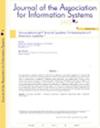The Vicious Circles of Skill Erosion: A Case Study of Cognitive Automation
IF 5.5
3区 管理学
Q1 COMPUTER SCIENCE, INFORMATION SYSTEMS
引用次数: 0
Abstract
Cognitive automation powered by advanced intelligent technologies is increasingly enabling organizations to automate more of their knowledge work tasks. Although this often offers higher efficiency and lower costs, cognitive automation exacerbates the erosion of human skill and expertise in automated tasks. Accepting the erosion of obsolete skills is necessary to reap the benefits of technology—however, the erosion of essential human expertise is problematic if workers remain accountable for tasks for which they lack sufficient understanding, rendering them incapable of responding if the automation fails. Though the phenomenon is widely acknowledged, the dynamics behind such undesired skill erosion are poorly understood. Thus, taking the perspective of sociotechnical systems, we conducted a case study of an accounting firm that had experienced skill erosion over a number of years due to reliance on their software’s automated functions. We synthesized our findings using causal loop modeling based on system dynamics. The resulting dynamic model explains skill erosion via an interplay between humans’ automation reliance, complacency, and mindful conduction. It shows how increasing reliance on automation fosters complacency at both individual and organizational levels, weakening workers’ mindfulness across three work task facets (activity awareness, competence maintenance, and output assessment), resulting in skill erosion. Such skill erosion may remain obscure, acknowledged by neither workers nor managers. We conclude by discussing the implications for theory and practice and identifying directions for future research.技能侵蚀的恶性循环:以认知自动化为例
由先进智能技术驱动的认知自动化正日益使组织能够自动化更多的知识工作任务。尽管这通常提供更高的效率和更低的成本,但认知自动化加剧了对自动化任务中人类技能和专业知识的侵蚀。接受过时技能的流失对于获得技术的好处是必要的——然而,如果工人仍然对他们缺乏足够理解的任务负责,使他们无法在自动化失败时做出反应,那么人类基本专业知识的流失就是有问题的。尽管这一现象得到了广泛认可,但人们对这种不受欢迎的技能流失背后的动力却知之甚少。因此,从社会技术系统的角度来看,我们对一家会计公司进行了案例研究,该公司由于依赖其软件的自动化功能而经历了多年的技能侵蚀。我们使用基于系统动力学的因果循环模型综合了我们的发现。由此产生的动态模型通过人类对自动化的依赖、自满和正念传导之间的相互作用来解释技能侵蚀。它显示了对自动化的日益依赖如何在个人和组织层面上培养自满情绪,削弱了工人在三个工作任务方面(活动意识、能力维护和产出评估)的专注力,导致技能侵蚀。这种技能流失可能仍然不为人所知,工人和管理者都没有承认。最后,我们讨论了理论和实践的意义,并指出了未来的研究方向。
本文章由计算机程序翻译,如有差异,请以英文原文为准。
求助全文
约1分钟内获得全文
求助全文
来源期刊

Journal of the Association for Information Systems
工程技术-计算机:信息系统
CiteScore
11.20
自引率
5.20%
发文量
33
审稿时长
>12 weeks
期刊介绍:
The Journal of the Association for Information Systems (JAIS), the flagship journal of the Association for Information Systems, publishes the highest quality scholarship in the field of information systems. It is inclusive in topics, level and unit of analysis, theory, method and philosophical and research approach, reflecting all aspects of Information Systems globally. The Journal promotes innovative, interesting and rigorously developed conceptual and empirical contributions and encourages theory based multi- or inter-disciplinary research.
 求助内容:
求助内容: 应助结果提醒方式:
应助结果提醒方式:


